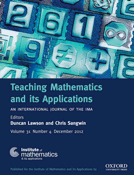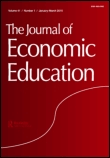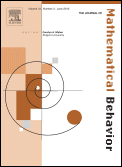
Teaching of Mathematics
Scope & Guideline
Empowering Educators with Cutting-Edge Pedagogical Insights
Introduction
Aims and Scopes
- Mathematics Education Research:
Exploration of innovative teaching strategies and pedagogical approaches to enhance mathematics education, addressing how students learn and understand mathematical concepts. - Application of Mathematical Concepts:
Research on the practical applications of mathematical theories and problems, including optimization, geometry, and algebra, to improve student engagement and comprehension. - Use of Technology in Teaching:
Investigating the integration of technological tools, such as software and virtual resources, in teaching mathematics, aiming to facilitate better learning experiences and representations of mathematical ideas. - Assessment and Evaluation:
Focus on methodologies for assessing student understanding and success in mathematics, utilizing various frameworks and theories to evaluate teaching effectiveness. - Historical and Theoretical Perspectives:
Examination of historical mathematical concepts and their pedagogical implications, providing a deeper understanding of the evolution of mathematics education.
Trending and Emerging
- Innovative Teaching Strategies:
There is a growing emphasis on innovative teaching strategies that encourage student engagement and conceptual understanding, such as case studies and experimental teaching approaches. - Technology-Enhanced Learning:
The integration of technology, including software like Maple, into mathematics education is becoming increasingly prominent, as educators seek ways to enhance learning through digital tools. - Interdisciplinary Applications of Mathematics:
Recent papers explore the interdisciplinary applications of mathematics, particularly in fields like economics and physics, showcasing the relevance of mathematical concepts in real-world scenarios. - Assessment Techniques Based on Representation:
Emerging research focuses on varied assessment techniques that utilize different representations in mathematics, reflecting a contemporary approach to evaluating student understanding. - Collaborative Learning and Peer Assessment:
There is an increasing interest in collaborative learning strategies and peer assessment in mathematics education, promoting student interaction and collective problem-solving.
Declining or Waning
- Historical Mathematical Proofs:
Papers centered on providing elementary proofs of classical theorems, such as Brauer's theorem, have decreased, suggesting a waning interest in purely historical perspectives in favor of more contemporary applications. - Traditional Geometry Problems:
The frequency of papers focusing solely on traditional geometric problems and constructions has diminished, indicating a shift towards more applied and technology-based approaches in geometry education. - Static Teaching Methods:
Research emphasizing static or traditional teaching methods without the integration of technology or innovative practices is becoming less common, reflecting a broader trend towards active learning and engagement in mathematics education.
Similar Journals

Journal of Mathematics Teacher Education
Exploring New Frontiers in Mathematics InstructionJournal of Mathematics Teacher Education, published by SPRINGER, serves as a pivotal platform for scholarly communication in the fields of Education and Mathematics. With a distinguished Q1 ranking in both disciplines and exceptional Scopus rankings—placing it in the top 94th percentile for Mathematics and the 84th percentile for Education—the journal is dedicated to advancing research and practice in mathematics education from a global perspective. Established in 2005 and converging towards 2024, it invites contributions that investigate innovative teaching strategies, curriculum development, and teacher education methodologies. Although the journal does not offer Open Access, its rich collection of empirical studies, reviews, and theoretical articles provides invaluable resources for educators, researchers, and students aiming to elevate the quality of mathematics instruction. Situated in Dordrecht, Netherlands, the Journal of Mathematics Teacher Education remains a significant asset to the academic community, fostering discussions that drive progress and enhance student learning experiences.

International Journal of Science and Mathematics Education
Advancing Knowledge in Science and Mathematics EducationWelcome to the International Journal of Science and Mathematics Education, an esteemed publication that has served as a vital platform for cutting-edge research in the fields of science and mathematics education since its inception in 2003. Published by SPRINGER in the Netherlands, this journal has consistently established itself in the top tier of academic publishing, as evidenced by its ranking in the Q1 category for both Education and Mathematics (miscellaneous) in 2023. With an impressive Scopus ranking placing it at #26 in General Mathematics and #269 in Social Sciences Education, the journal is a must-read for researchers, educators, and policymakers dedicated to enhancing the teaching and learning of mathematics and science. Although not open access, the journal is committed to disseminating high-quality research that bridges theory and practice, fostering innovative approaches and collaboration within the academic community. By supporting empirical studies, methodological advancements, and theoretical discussions, the International Journal of Science and Mathematics Education plays a crucial role in shaping educational practices and policies worldwide.

Avances de Investigacion en Educacion Matematica
Connecting Researchers and Educators for Enhanced Learning Outcomes.Avances de Investigacion en Educacion Matematica, published by the SOC ESPANOLA INVESTIGACION & EDUCACION MATEMATICA-SEIM, is a prominent open-access journal dedicated to advancing research and education in the field of mathematics. Since its inception in 2018, this journal has provided a platform for scholars to disseminate innovative findings and pedagogical strategies that enrich mathematical understanding and enhance educational practices. With an impact factor that places it in the Q2 quartile for both Education and Mathematics (Miscellaneous) categories, the journal ranks 179th among General Mathematics publications and 936th in Education, indicating a growing influence within the academic community. Based in Spain, Avances de Investigacion en Educacion Matematica is committed to fostering collaboration and extensive discourse among researchers and educators alike, empowering them to address contemporary challenges in mathematics education. As an open-access journal since 2022, it offers both researchers and practitioners unrestricted access to valuable resources and articles, ensuring that cutting-edge research is widely available to those who shape the future of mathematics education.

Edma 0-6-Educacion Matematica en la Infancia
Enhancing Early Learning Experiences Through Mathematics.Edma 0-6-Educacion Matematica en la Infancia is an esteemed academic journal dedicated to exploring the methodologies and practices of mathematics education for children aged 0 to 6 years. Published by the UNIV COMPLUTENSE MADRID, GRUPO INVESTIGACION & DIDACTICA MATEMATICAS, this journal serves as a platform for researchers, educators, and practitioners who aim to enhance early childhood mathematics education through innovative insights and comprehensive studies. While its impact factor is yet to be established, the journal is poised to contribute significantly to the field, promoting an open dialogue on instructional strategies, curriculum development, and pedagogical frameworks. The journal is accessible through its Open Access policy, ensuring that valuable research reaches a wider audience without barriers. With the growing recognition of the importance of early mathematics education, Edma 0-6 aims to be a cornerstone resource, empowering stakeholders to shape meaningful learning experiences for young learners. Submissions and inquiries can be directed to the Department of Mathematics Didactics at the Universidad Complutense de Madrid, located in Madrid, Spain.

Teaching Mathematics and Its Applications
Exploring New Horizons in Mathematics PedagogyTeaching Mathematics and Its Applications is a prestigious interdisciplinary journal published by Oxford University Press, focusing on innovative pedagogical approaches and research in the fields of mathematics and education. With an impressive impact factor and ranking in the top quartile (Q1) for both education and miscellaneous mathematics categories, the journal is an essential resource for researchers, educators, and practitioners aiming to enhance mathematics teaching and learning. Since its inception in 1982, the journal has provided a platform for the dissemination of cutting-edge research, reviews, and case studies that foster the advancement of mathematical literacy and application across diverse educational settings. While the journal is not open access, its wide reach and the significant Scopus rankings—86th in General Mathematics and 688th in Education—reaffirm its status as a leading authority in the discipline. By emphasizing both theoretical perspectives and practical applications, Teaching Mathematics and Its Applications plays a vital role in shaping the future of mathematics education worldwide.

STUDIA MATHEMATICA
Championing Rigorous Research in MathematicsSTUDIA MATHEMATICA is a distinguished journal published by the Polish Academy of Sciences Institute of Mathematics - IMPAN, dedicated to advancing the field of mathematics since its inception. With an ISSN of 0039-3223 and an E-ISSN of 1730-6337, this journal serves as a significant forum for mathematicians worldwide to disseminate innovative research and theoretical advancements. Operating under a stringent peer-review process, STUDIA MATHEMATICA boasts a commendable impact factor that places it in the Q2 category within the mathematics discipline, indicating its critical role in the academic community. Covering a broad spectrum of mathematical topics, the journal aims to encourage interdisciplinary collaboration and foster a deeper understanding of both applied and theoretical aspects of mathematics. Researchers, professionals, and students alike will find a wealth of knowledge in its pages, contributing to the development of the mathematics field from its base in Warsaw, Poland. As it converges various strands of mathematical thought from 1996 to 2024, STUDIA MATHEMATICA continues to uphold its reputation as an essential resource for contemporary mathematical scholarship.

Chemistry Teacher International
Empowering Educators Through Open Access ResearchChemistry Teacher International is a prominent peer-reviewed journal dedicated to the field of chemistry education, published by WALTER DE GRUYTER GMBH. With its Open Access policy since 2018, this journal ensures that research is widely disseminated to educators, researchers, and practitioners globally. Located in Berlin, Germany, it aims to promote innovative teaching methodologies and practical applications in chemical sciences. The journal has consistently achieved a Q2 ranking in both the Chemistry (Miscellaneous) and Education categories as of 2023, reflecting its relevance and impact within the academic community. Over its converged years from 2019 to 2024, Chemistry Teacher International fosters a collaborative platform for sharing research, insights, and pedagogical strategies, thereby contributing to the advancement of chemistry education on a global scale.

JOURNAL FOR RESEARCH IN MATHEMATICS EDUCATION
Empowering educators through innovative insights in mathematics.The JOURNAL FOR RESEARCH IN MATHEMATICS EDUCATION, published by the NATIONAL COUNCIL OF TEACHERS OF MATHEMATICS (NCTM), stands as a premier platform for scholarly discourse in the realm of mathematics education. With an impactful position bolstered by Q1 rankings in both Education and Miscellaneous Mathematics for 2023, this journal has gained notable recognition, ranking 6th out of 90 in the mathematics category and 261st out of 1543 in social sciences education on Scopus. Spanning research outputs from 1996 to 2024, it serves as an invaluable resource for educators, researchers, and students alike, fostering an understanding of innovative teaching methodologies, pedagogical advancements, and mathematical cognition. Though not openly accessible, its rich content is crucial for anyone invested in enhancing mathematics education and supporting the development of effective teaching practices. To explore significant findings and trends in mathematics education, this journal is indispensable for academic professionals aiming to elevate their research and educational strategies.

JOURNAL OF ECONOMIC EDUCATION
Shaping Tomorrow’s Economists through Quality EducationJOURNAL OF ECONOMIC EDUCATION, published by Routledge Journals, Taylor & Francis Ltd, serves as a pivotal platform for the dissemination of research in the vital intersection of economics and education. With an ISSN of 0022-0485 and an E-ISSN of 2152-4068, this esteemed journal has been contributing to the field since 1969 and continues to evolve with influential insights projected through to 2024. Ranking in the Q2 category for both Economics and Econometrics, and Education as of 2023, it demonstrates a significant commitment to enhancing educational practices in economics. Researchers and educators alike will find value in its empirical studies, theoretical explorations, and innovative pedagogical approaches. Although currently not offering open access, the journal maintains a competitive reputation with a Scopus rank placing it in the 54th and 47th percentiles across its related fields. Join the scholarly dialogue that shapes the future of economic education and informs teaching methodologies across the globe.

Journal of Mathematical Behavior
Unlocking the Secrets of Mathematical BehaviorThe Journal of Mathematical Behavior, published by ELSEVIER SCIENCE INC, is a premier interdisciplinary journal dedicated to the exploration of mathematical thinking, learning, and education. With a strong history of publication since 1994 and converging towards 2024, this journal offers vital insights and innovative research in the fields of Applied Mathematics, Applied Psychology, and Education, holding notable rankings in various categories, including Q1 in Education and Q2 in both Applied Mathematics and Psychology as of 2023. The journal is positioned favorably in Scopus rankings, highlighting its impact in the realms of Mathematics and Education. It serves as a critical platform for researchers, educators, and practitioners aiming to enhance pedagogical strategies and foster effective mathematical understanding. Although it does not offer open access, the journal remains a cornerstone for advancing knowledge and dialogue within the mathematical education community,** making it an essential resource for anyone invested in the complexities and applications of mathematical behavior.